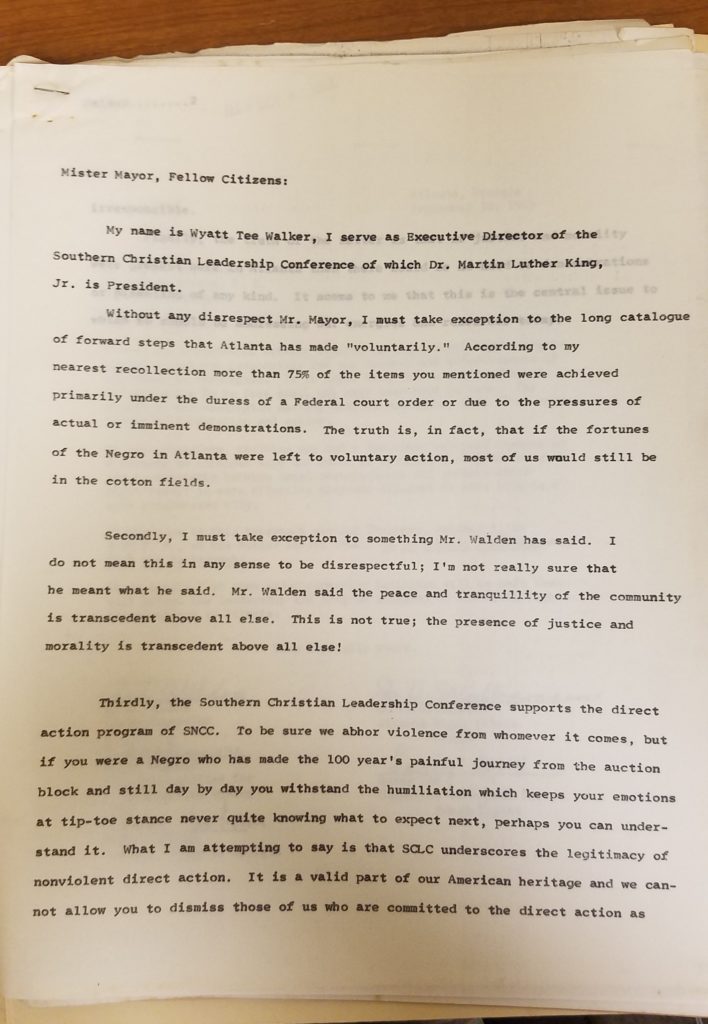(Note: This post was authored by Taylor McNeilly, Processing & Reference Archivist.) I happened across another one of the folders of material included in the Dr. and Mrs. Wyatt Tee Walker Collection from Dr. Walker’s time with SCLC while processing this past week. This folder, labeled “Atlanta conf.,” included material from 1963-1964 concerning Atlanta, GA. For this week’s #WyattWalkerWednesday, I’d like to talk about some of the material I found there.
During this period, the Student Nonviolent Coordinating Committee (SNCC) was incredibly active in the Atlanta area, protesting segregation and economic inequality. Similar to the criticism Dr. Martin Luther King, Jr. and the SCLC faced after their demonstrations in Birmingham, AL, SNCC faced backlash from many different directions, including an open letter addressed to the mayor of Atlanta on KKK letterhead criticizing, among other things, how he handled the “race riots” of January 1964. SNCC, having been founded by then-director of SCLC Ella Baker among other SCLC employees, was also partially funded by grants from SCLC, so naturally SCLC was not only aware of SNCC’s activities in Atlanta but defensive of its practices – many of which mirrored nonviolent protest techniques SCLC used. Another open letter addressed to the mayor of Atlanta, this time written by Dr. Walker, defends the actions of SNCC and the need for direct, nonviolent action.

A letter criticizing the mayor of Atlanta and declaring support for nonviolent direct action written by Dr. Wyatt Tee Walker.
This letter is particularly striking to me for several reasons. First is Dr. Walker’s declaration that “the presence of justice and morality is transcendent above all else!” This quote, refuting the claim that “the peace and tranquility of the community is transcendent above all else,” seems very pertinent to the discussion surrounding many of the protests and demonstrations that have occurred over the past few years, especially those by the Black Lives Matter (BLM) and Occupy Wall Street groups.
The SCLC, under the direction of Drs. King and Walker, focused on nonviolent direct action, so it is no surprise that Dr. Walker speaks out in support of SNCC’s activities. However, I was particularly moved by the third paragraph pictured above, quoted below.
Thirdly, the Southern Christian Leadership Conference supports the direct action program of SNCC. To be sure we abhor violence from whomever it comes, but if you were a Negro who has made the 100 year’s painful journey from the auction block and still day by day you withstand the humiliation which keeps your emotions at tip-toe stance never quite knowing what to expect next, perhaps you can understand it. What I am attempting to say is that SCLC underscores the legitimacy of nonviolent direction action. It is a valid part of our American heritage and we cannot allow you to dismiss those of us who are committed to the direct action…
These sentences strike several chords for me. First and foremost is SCLC’s support and defense of SNCC, as well as their continued support of nonviolent direct action. This comes as no surprise to anyone who has studied either of these organizations, but the public declaration of solidarity and support is moving nonetheless. More striking is the seemingly effortless balance Dr. Walker strikes between an emotional evocation of the continued struggles for African Americans and the professionally distanced tone of a man discussing the theory and history of protest in America. Finally, Dr. Walker’s appeal to American heritage helps cement this incredibly strong and passionate defense of nonviolent direct action.
This folder of material held much more than Dr. Walker’s impassioned defense of SNCC and nonviolent direct action, but unfortunately I can’t talk about every single item I find during processing. But as always, check back here next week for another peek into the collection! You can always follow along on our other social media as well, including Boatwright Library’s Facebook, Instagram, and Twitter.
